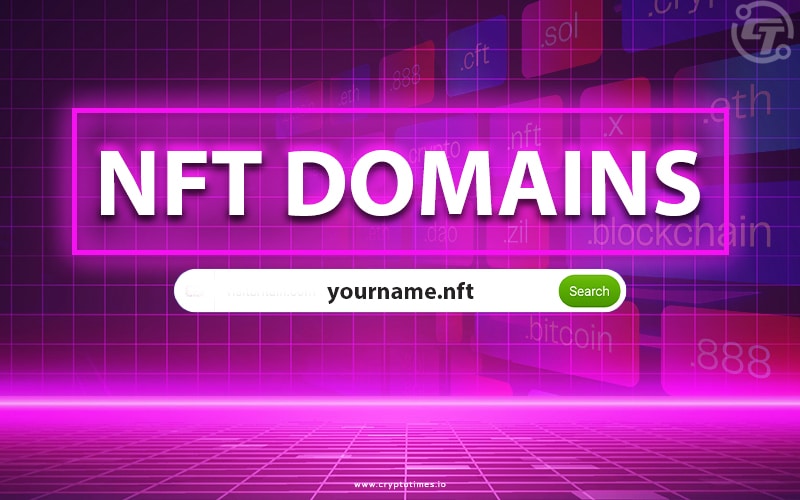NFT domains are an exciting and comparatively new concept that has permeated the entire Web3 space. Many experts believe that when learning more about Web3, one must always start with an NFT domain.
If you have heard of NFTs (Non-Fungible Tokens) but need clarification on what they are and how they work, NFT domains are a great place to start. These domains are changing how we think about digital ownership and are becoming increasingly popular in art, collectibles, and domain names.
What are NFT Domains?
NFT domains are unique digital assets that are stored on a blockchain, representing ownership of a specific piece of digital content, such as artwork, music, or even a website domain. Unlike traditional domain names, NFT domains cannot be replicated, copied, or duplicated, making them truly one-of-a-kind.
Instead of a conventional alphanumeric string, they give people and businesses a more memorable and personalized web address. Having a distinctive online presence is essential in today’s digital world for developing a brand and connecting with various audiences.
According to Bitcoineer, NFT domains offer a new level of ownership and control over a website’s address, making them valuable to any online presence.
How are NFT Domains Different From Other Domains?
NFT domains differ from conventional domains primarily because they are non-fungible. Unlike traditional domains, each NFT domain is unique and cannot be replaced by another with an identical name. This quality has led to NFT domains being referred to as “digital assets,” while traditional domains are sometimes called “vanity” domains.
There are various types of NFT domains, each with specific characteristics and applications. For example, the ENS domain, an Ethereum-based NFT domain, provides access to decentralized websites and applications. Another popular variety of NFT domain is the top-level domain “crypto,” which can be used to develop websites or applications with a blockchain and cryptocurrency theme.
Why are NFT Domains Important?
NFT domains are crucial because they offer a new level of authenticity and security in the digital world. By utilizing blockchain technology, NFT domains can track and verify ownership of a specific digital asset, eliminating fraud issues and ensuring that the rightful owner is appropriately credited.
Moreover, NFT domains offer new flexibility regarding ownership and transfer. They can be easily bought, sold, and traded, making them ideal for collectors, investors, and anyone interested in owning unique digital assets.
How to Get an NFT Domain
Obtaining an NFT domain can be a simple process, but it’s important to note that availability can vary, and others may already own some. However, with the growing popularity of NFT domains, there is usually a wide selection available.
- Choose a marketplace: To start the process, choose a marketplace. Several popular marketplaces, such as OpenSea, Rarible, and SuperRare, offer a vast array of NFT domains to choose from.
- Browse and select: Next, browse through the available options and select the NFT domain that interests you the most. Each NFT domain is unique, so you can select one that aligns with your interests or goals.
- Make a Payment: Once you’ve found your desired NFT domain, you can make a payment using cryptocurrencies like Ethereum or Bitcoin. The payment process may vary depending on the marketplace, but it’s typically straightforward and secure.
- Claim your NFT Domain: After you complete the payment, you can claim your NFT domain. The domain will be stored in your digital wallet, and you will become the sole owner of the digital asset.
Acquiring an NFT domain can be an excellent opportunity for digital ownership. It’s worth exploring, whether you’re an artist, collector, investor, or simply someone looking to own a unique piece of the digital world.
Best Platforms to Get an NFT Domain:
NFT domains are a new and exciting development in digital ownership. They offer a level of authenticity, security, and flexibility, making them an attractive option for collectors, investors, and anyone looking to own a unique piece of the digital world. If you’re interested in buying an NFT domain, there are several platforms to choose from. It’s important to investigate and compare different platforms to find one that suits your requirements and tastes.
- OpenSea: OpenSea is one of the most popular marketplaces for NFT domains. It offers a wide range of NFT domains, including art, collectibles, and website domains.
- Rarible: Rarible is another popular marketplace that focuses on creativity and community. It provides a simple and intuitive platform for buying, selling, and trading NFT domains.
- SuperRare: For those seeking high-end and unique digital assets, SuperRare is a great option. This platform offers a carefully curated selection of NFT domains, including art, music, and more.
- Nifty Gateway: Nifty Gateway, on the other hand, focuses on celebrity and pop culture-related digital assets. It offers a range of NFT domains, including rare and exclusive items.
- Foundation: Foundation is another platform worth considering, as it offers a variety of NFT domains, including art, collectibles, and website domains. Its user-friendly platform makes it easy to buy, sell, and trade NFT domains.
Also Read: The Rise of NFT Marketplaces: How to Choose the Right One for You
When choosing a platform, it’s essential to consider factors such as features, costs, and policies. Each platform has its own unique features, and costs and policies can vary significantly. Therefore, it’s important to carefully compare and contrast platforms to find the best one for your needs.
Conclusion:
NFT domains are a promising new asset class in the digital world. Whether you’re a collector, investor, or just someone looking to own a unique piece of the digital world, NFT domains are definitely worth exploring. By leveraging the benefits of authenticity, security, and flexibility, NFT domains are poised to play a significant role in the future of digital assets.
Also Read: Ordinal Inscriptions vs. NFTs: What’s the Difference?





